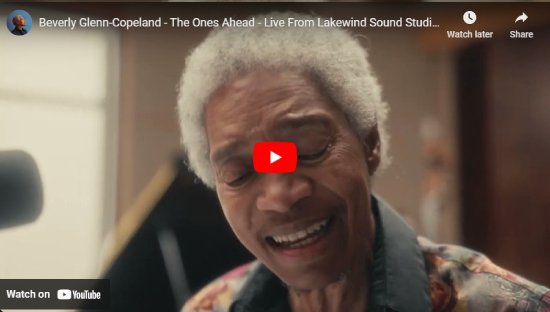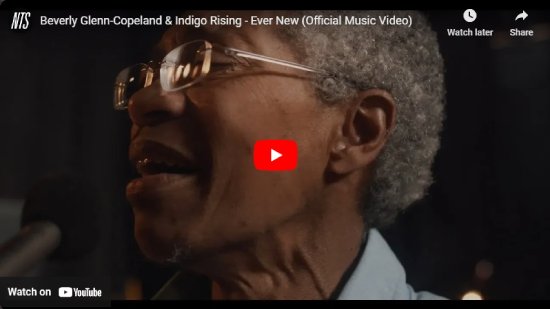Some 20 years ago, Beverly Glenn-Copeland briefly adopted the musical nom de plume Phynix. “I had spent decades trying to make a go of it musically,” the singer-songwriter recalls. “The name spoke to a hope I carried deep inside, to rise up from the ashes of what seemed like a failed career.”
That hope has been realized in startling ways. In 2015, his independent cassette release Keyboard Fantasies (1986) was unearthed by the proprietor of an influential record store in Japan, whose customers were captivated by the album’s translucent, burbling digital counterpoint and Glenn-Copeland’s soothing voice. He found a label deal (with Transgressive Records), embarked on his first-ever tour dates (from Utrecht to the Yukon), became the subject of a documentary (Keyboard Fantasies: The Beverly Glenn-Copeland Story, by British filmmaker Posy Dixon), and won the 2020 Slaight Polaris Heritage Prize for the re-issued album. He’s been acknowledged as an inspiration to a generation of adventurous musicians (including Bon Iver and Arca, who’ve re-worked his music, and Romy, who sampled the Phynix song “La Vita” on her single “Enjoy Your Life”, as well as an elder to trans youth (Glenn-Copeland made his own public transition in 2002). The 2023 release of The Ones Ahead – his first studio album in 19 years – garnered him the kind of critical acclaim that’s rarely afforded to a “late-career” artist.
Now 80, Glenn-Copeland retains his resolute focus on the future. For him, The Ones Ahead is “a vehicle for encouraging the generations of young people coming up in these difficult times, an essential offering for affirming their humanity.” In its more meditative moments, the album is a balm; in others, with dramatic gestures and insistent rhythms, it’s a spark. On the sweeping title track, Glenn-Copeland sings, “This world is our combined imagination / Your life a precious personal creation.” From his new home in Hamilton, he explains, “These lyrics are an encouragement for ‘the ones ahead,’ a reminder of the power we carry inside, the power that, once felt, can be collectively realized.”
Glenn-Copeland has called himself a “musical monk”; indeed, he made Keyboard Fantasies by himself in a cabin in the Muskoka, Ontario woods. But for The Ones Ahead, he de-cloistered with Indigo Rising, the band of younger musicians he had assembled to tour in 2018.
Each contributed to the arrangements. Says Glenn-Copeland, “The process of rehearsal and recording was much more collaborative than anything I’ve done for a long time, taking me back to my early days in the studio.” He’s referring to his first two albums – Beverly Copeland (1970) and Beverly Glenn-Copeland (1971) – on which the singer-songwriter was accompanied by adventurous Toronto jazz players, such as guitarist Lenny Breau and keyboardist Doug Riley.
The Ones Ahead involved another, more mystical, kind of collaboration. “As part of my Buddhist practice,” says Glenn-Copeland, “I pray for and with my ancestors. I feel their presence from time to time, and actively encourage myself to listen for what they have to share. They came through, big-time, on the album.”
On the opening track, “Africa Calling,” his wordless vocals are soulful invocations, buffeted by layers of percussion. “It began as an exploration into a strange time-signature,” says Glenn-Copeland. “If I had stayed stuck on that idea, I would have missed the bigger gift, which was a song that eventually morphed into a full-out ancestral calling from my West African heritage.” The Ones Ahead ends with “No Other,” on which, he says, “You can hear my Indigenous roots in the vocalizations and rhythms. My grandmother on my father’s side was Cherokee. She was a powerful woman who gave me a special kind of grounding, based in embodied knowledge of the natural world.”
“No Other” was originally part of a song cycle Glenn-Copeland wrote in 2015, while he and his wife, Elizabeth Paddon, were living in New Brunswick. Other songs on the album were drawn from varied times and sources. The rousing “Stand Anthem” hails from a 2017 “eco-play” by Paddon, while the ballad “Harbour” is one of a series of songs Glenn-Copeland has penned for her every year, as birthday gifts. The gentle “Prince Caspian’s Dream,” meanwhile, had been gestating for decades before the recording session. It was originally inspired by a dear friend: “There was something magical about her.” The lyrics, says Glenn-Copeland, “speak to the character in [C.S.] Lewis’s book [Prince Caspian] finding his rightful place. Over the 30 years it took me to write this song, I have grown up, have come to have a small understanding about the essential simplicity at the heart of it all.”
For Glenn-Copeland, the recording process was “a simple musical joy for an old monk” – despite health challenges that he continues to face. Being immuno-compromised, he cancelled a tour scheduled for October 2023 because of the risk of contracting COVID-19 in indoor venues. “It looks like from now on, any live shows will have to be outside,” he says. “My label is keen to get me over to Europe, so we’re exploring options.”
In the meantime, he enthuses, “For the first time since 2020, I’m actually writing music again! Elizabeth and I are looking forward to getting back to collaborating creatively, which is how we began, and we have some exciting irons in the fire”—including a children’s TV show, and re-working a musical he wrote in 2010.
Key to his creative practice is to be a “willing creative partner” to the ideas that may arrive at any moment: “During my days, I try to stay open, to listen for musical ideas in the wind, in the birdsong, in the animated conversation of friends,” he says. “The music always feels like a welcome visitor, a sacred guest I must attend to. I go into a bit of altered state when I write – it’s a blessed place to be.”

